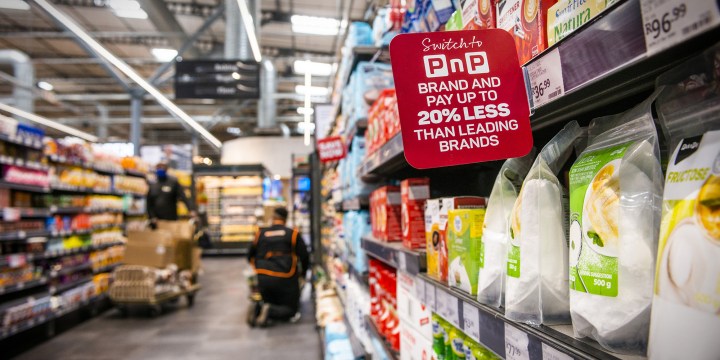BUSINESS MAVERICK
Pick n Pay CEO stays to fight another day

It is not so much the results from one of the country’s largest retailers that indicates how tough the environment is; it is the steps it is taking to mitigate against future difficulties that cause a quickening of the heart rate and tightness of breath.
Ahead of the nationwide lockdown in March, panic buying set in. It was survival of the fittest as shoppers, concerned that supply chains would break down, stocked up on their basics.
According to retailer Pick n Pay, essentials like rice, spaghetti, sunflower oil, long-life milk, bleach and toilet paper flew off the shelves. Oh, and vodka too. Sales of Absolut vodka increased by 104% ahead of lockdown.
Since then, under lockdown, shopping behaviour has shifted noticeably. Consumers are shopping less often, and buying more per visit, and are favouring smaller, more local stores – none of which will surprise anyone.
Sales of cake flour and brown sugar have spiked – there is more time to bake – as have sales of curry powder, non-alcoholic beer and kids’ painting sets.
E-commerce, which has been growing slowly but steadily over the last decade, shot through the roof.
Since the declaration of a National State of Disaster, Pick n Pay registered more than 144,000 new online customers, reflecting 1,000% growth in first-time customers over the previous year. Resultant turnover growth (online) was over 100% year-on-year.
But for those who believe the big grocery retailers are making a killing as essential service providers, think again.
“The Covid-19 crisis will put pressure on margins and profitability,” said CEO Richard Brasher during the presentation of the group’s financial results for the 52 weeks ended 1 March 2020.
While the lockdown began after the financial year ended and had no impact on the current results, the impact on the first few weeks of trading is clear.
“Categories like liquor, tobacco, clothing and most general merchandise lines make up 20% of our revenues, and have relatively high margins compared with basic food and grocery lines,” says Brasher.
In addition, while shopping activity has reduced, costs have increased. These are the costs incurred by extra hygiene and social distancing measures. In addition, the group paid appreciation bonuses of R1,000 per person to front-line staff for their work during the lockdown.
Meanwhile, financial results for the year were muted, reflecting the difficult economic climate before the pandemic reared its head.
Turnover increased by 4.7% to R89.2-billion. Growth was slower than the previous year’s 7.1%, and was affected by load shedding and labour disruptions in the supply chain over the busy Christmas period, says CFO Lerena Olivier.
Profit before tax rose by 6% to R1.8-billion, dampened by negative growth in the Rest of Africa business, specifically Zambia and Zimbabwe.
Comparable headline earnings per share of 278.81 cents was just lower than the previous year’s earnings, impacted by an increase in the tax rate from 24% to 31.2%.
“There were two primary reasons for the tax increase,” explains Rella Suskin, head of research at Benguela Global. “Hyperinflation accounting for the Rest of Africa operations contributed 3.3% to the 6.9% tax increase reported.”
Similar increases were evident in Shoprite’s financials last year and at their half-year. This is likely to continue to affect the business as long as the hyperinflation and currency devaluation in Rest of Africa continues, she says.
In addition, there was a substantial reduction in Pick n Pay’s share-scheme obligations given the fall in the share price.
This contributed 4.2% to the 6.9% tax increase reported, Suskin says.
Investors appeared dismayed by the news that headline earnings had fallen. In addition, the news that management has opted to delay the dividend in the face of significant uncertainty appeared to add insult to injury and the share tumbled 13.8% on the day to R51.25.
“The board will consider a formal dividend declaration once the full impact of the Covid-19 pandemic on the group’s operations, liquidity position and cash resources are reasonably known,” says Olivier.
Regardless of investors’ initial reactions, some analysts see the result as positive.
“There is no doubt that this is a far better PnP than it was five years ago,” says Reuben Beelders, CIO at Gryphon Asset Management. “The company is heading in the right direction and investors should take heart from the steps that management is taking to strengthen the business.”
These include range optimisation, pushing its own label, centralised distribution, smaller format stores that are closer to home, and more value-adding services.
Management is busy.
The commitment to take R1-billion in costs out of the business over the next two years and determination to create a “simpler, more effective” organisation will go some way to strengthening the organisation in an environment where top-line sales are going to be thin, he adds.
It was the outlook statement that rattled investors, says Suskin. Management made a number of statements suggesting that FY21 will be tough, which include guiding investors to expect margin and earnings pressure in the FY21 year.
“The cut in the dividend is very prudent for a highly cash-generative company with low debt. They are also looking to take on committed borrowing facilities for the first time in a number of years as a precautionary measure.”
Shareholders will also take heart from the news that CEO Richard Brasher has committed to staying on with the group for at least another year. Since his arrival in February 2013, he has overseen a significant turnaround in the company, as the charts below demonstrate.

Source: PnP results presentation, 2020.
However, instead of announcing that he was stepping down, the CEO told investors that he is “stepping up” due to the uncertainties caused by the Covid-19 pandemic.
“This is commendable,” says Suskin. “He could have used this opportunity to leave on a good note, having successfully orchestrated a change in supply chain strategy – the results are evident in the sustainable margin improvements.
“We have seen a number of CEOs step down now despite the unprecedented challenges that their businesses are about to face. The consistency of a strong leader throughout this period can make all the difference.” BM

















